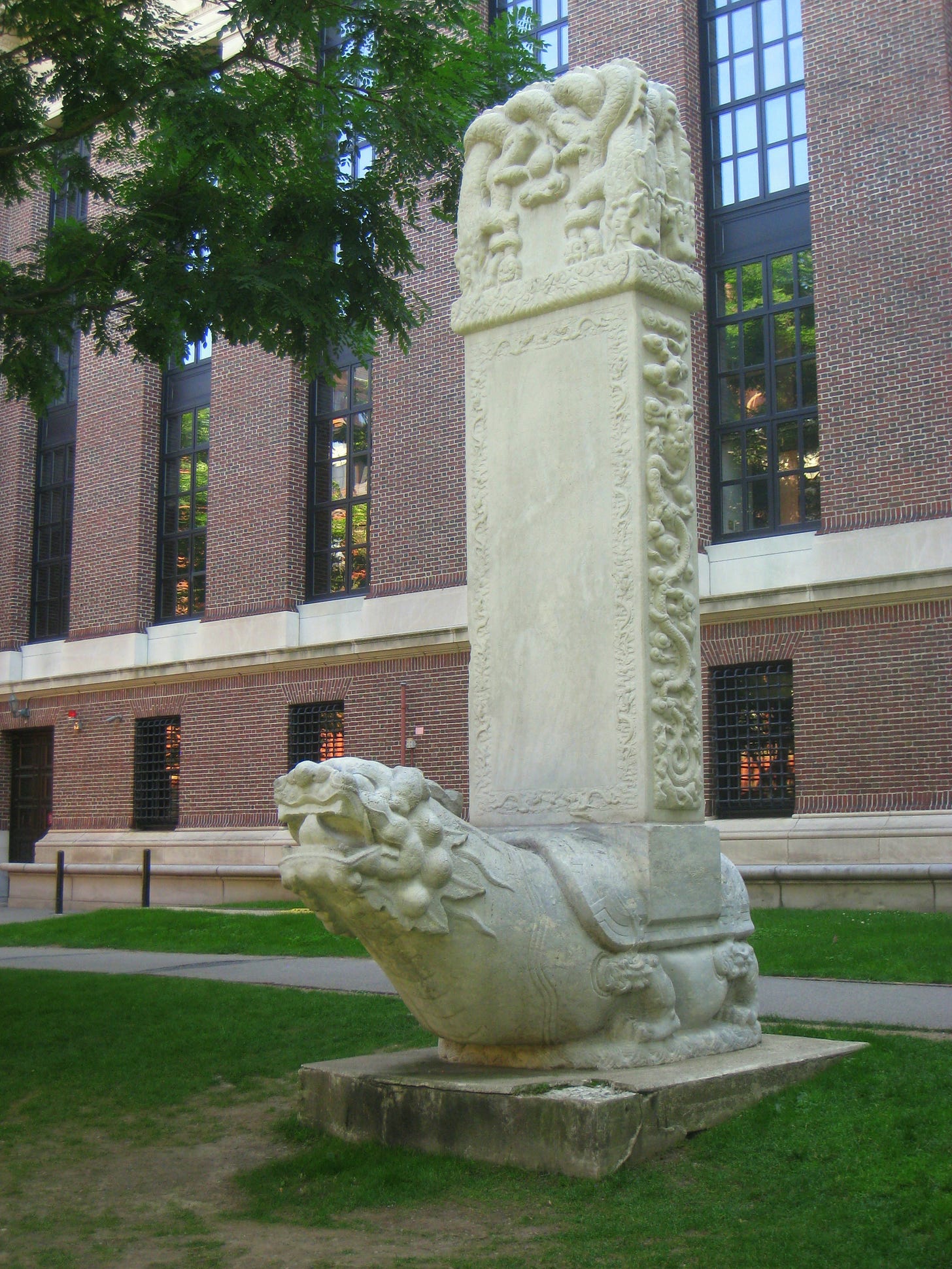
Han Yu's Carved Stele Li Shangyin The circumstances of the mission It was the Yuanhe reign; our king, Xianzong, Possessed a military might so strong The only apt comparison would be The Yellow Emperor, or great Fuxi. He swore an oath that he’d erase the shame Of insults to the emperors who came Before: in the Hall of Law they’d be redressed With tribute sent from north, south, east and west. For fifty years, the West Huai territory Had suffered under lawless banditry. When feral dogs grow insolent, they dare To make themselves a tiger, then a bear: They’d left their hills and valleys for the plain, And brandished pikes and spears without restraint (As if, like Master Lu Yang, they could scare The setting sun back up into the air). The commander and his men The Premier, Du’s, protection was divine: The bandits sent assassins; he survived. As dismal winds assailed the royal standard, He took the seal as our supreme commander, With Su, Wu, Gu and Tong his teeth and claws, A hundred-forty thousand in his force, Logistics were in Li Zongmin’s sure hands, His secretary, that brave and wise man, Han. The campaign and the victory They swept through Caizhou, took the traitor, bore Him back as sacrifice. A rich reward To match the heroes’ peerless deeds was sure. The Emperor announced: “Your service, Du, Is of first grade; commemorate it, Yu!” First Han Yu bowed, then stamped and raised his fists: “Your servant knows both bronze and granite scripts. Historic steles are called ‘great penmanship;’ My rank is far too low to merit it, But honour binds me to accept,” he said, To which the Son of Heaven inclined his head. Han prepares the stele So Han retreated to his writing cell And flourished his great brush with verve and skill, The books of Yao and Shun enriched his terms; He browsed the Book of Poetry for forms, Transcended every school in one great page, Then laid it on the Emperor’s crimson stage. “On pain of death, your servant Yu submits This stele text praising legendary exploits!” The tablet must have been ten metres high, A turtle bore it; dragons wrapped the side; The characters were drinking ladle-sized. Slander and destruction But those ringing lines were understood by few, So liars claimed Han gave a biased view. With a hundred feet of rope, they toppled it, And rubbed the carvings smooth with stones and grit. But mighty texts possess protean force; They seep into a reader’s spleen and thoughts: Confucius’ daily cooking pot is gone, And the basin of King Tang; but they live on Because they were cast with powerful words. The vessels are lost; their message is still heard. The author’s wish Great sovereign, and your minister so sage! How can your light illuminate our age If Han’s text disappears? How could we know You equalled mythic kings from long ago? I wish I had ten thousand copies still. I’d read it out ten thousand times, until The spittle ran from the corners of my mouth, My finger callused from tracing it out. Our god-kings have an altar for libations, This stone should be a brick in its foundations, May Han’s great stele last seventy-two generations! 李商隐 韩碑 元和天子神武姿,彼何人哉轩与羲。 誓将上雪列圣耻,坐法宫中朝四夷。 淮西有贼五十载,封狼生貙貙生罴。 不据山河据平地,长戈利矛日可麾。 帝得圣相相曰度,贼斫不死神扶持。 腰悬相印作都统,阴风惨澹天王旗。 愬武古通作牙爪,仪曹外郎载笔随。 行军司马智且勇,十四万众犹虎貔。 入蔡缚贼献太庙,功无与让恩不訾。 帝曰汝度功第一,汝从事愈宜为辞。 愈拜稽首蹈且舞,金石刻画臣能为。 古者世称大手笔,此事不系于职司。 当仁自古有不让,言讫屡颔天子颐。 公退斋戒坐小阁,濡染大笔何淋漓。 点窜尧典舜典字,涂改清庙生民诗。 文成破体书在纸,清晨再拜铺丹墀。 表曰臣愈昧死上,咏神圣功书之碑。 碑高三丈字如斗,负以灵鳌蟠以螭。 句奇语重喻者少,谗之天子言其私。 长绳百尺拽碑倒,粗砂大石相磨治。 公之斯文若元气,先时已入人肝脾。 汤盘孔鼎有述作,今无其器存其辞。 呜呼圣王及圣相,相与烜赫流淳熙。 公之斯文不示后,曷与三五相攀追。 愿书万本诵万遍,口角流沫右手胝。 传之七十有二代,以为封禅玉检明堂基。
This poem by Li Shangyin (813-858) is a tribute to a poem by Han Yu (768-824). Li, better known for mythic, romantic poetry, takes on something closer to a historical epic, though he chooses not to address the war and politics directly. Instead he examines the fate of a commemorative stone tablet - a stele - as a way of showing how fickle politics can be, and how the sweep of history will eventually vindicate the best people.
The Yuanhe Reign was the reign of the Emperor Xianzong, from 805-820 (actually, Yuanhe didn’t start till 806).
The Yellow Emperor and Fuxi were mythic heroes from the first days of the Chinese people.
The Hall of Law was the hall in which the Emperor conducted the public business of the realm, which would include accepting fealty from local chieftains within the empire.
West Huai territory - an area to the west of the River Huai, in modern Henan Province.
Master Lu Yang was battling rebels in the northeast, and unsatisfied with the amount of punishment he had given in one day, he waved his spear at the sun and frightened it back a couple of hours, so that he could continue his work.
Premier Du - Pei Du did indeed survive an assassination attempt.
The traitor - Wu Yuanji, a general turned warlord in West Huai.
Stamping and raising your fists was what you did to signify obedience to a royal command during an audience with the emperor.
Confucius’ daily cooking pot, basin of King Tang - both contained admonitions to be humble, which the users would see every day when they cooked or washed their face. The texts are still extant, though the items have long been lost. The urn said: “Bow when you receive your first commission; bow deeper when you receive your second; bow to the ground when you receive your third. Walk close to the wall; no one will think the less of you. Millet or rice porridge from me is all you need.”
The text of the Han Yu stele does indeed survive to this day, so Li Shangyin was right on that account. I couldn’t find an English translation of it, and didn’t have time to translate it myself, so we’ll just have to take Li’s word for what it says. In terms of the poetry, I think this is a very creditable imitation of Han Yu’s style, and shows quite a different side of Li Shangyin.



I know the stele well.
Hands down my favourite poet although that’s entirely for 相见时难别亦难